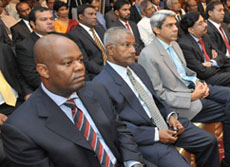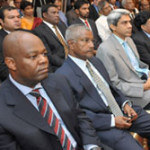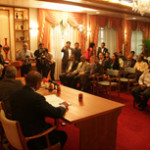The price of fuel at the airport has increased 35.39 percent at the airport and 35.67 percent internationally, Harrison said, in an update on progress at the airport during an initial 180 day strategy period following the company taking the reins.
“We are not even passing over the full increase in prices of fuel – we’re sensitive to airline customers and what the price of fuel means to them,” Harrison said. “The escalating price is affecting the whole global economy, and affects airlines directly not just here but at all other locations.”
Harrison sought to head off concerns aired recently that the cost of fuel at Male’ International Airport was impacting airlines’ willingness to fly to the destination.
“No airline has come forward and said they are unhappy with our pricing, but they are concerned about the global price of fuel,” he said. “With all the volatility there are challenges there.”
“We are working on some strategies to reduce the cost of providing fuel to them. We’ve spent the last six weeks meeting airlines – some want credit terms, others a set supply criteria – we are trying to meet the need of the majority.”
“The pricing of fuel is not something we compare one place to another, because there are many variables including the method of delivery and the volume you’re buying. The size of the berth we have limits the size of vessel we can charter, and these factors affect the price we can buy and supply fuel at.”
GMR had signed a US$140 million contract with the State Trading Organisation (STO) to supply fuel, he added, switching the contract over from Dubai-based Galana Petroleum.
“Our sense was it was better to use a company right here with us that would share in the risk and opportunity and try to get us the best possible price – for instance, the STO has its own vessel, and may not need to charter one. They made an extremely competitive bid.”
Many airlines, he explained, used a middleman reseller who bought fuel and sold it by offering components such as credit terms.
“Resellers may be in a better position to do that, as we are not a company in the business of providing credit terms to airlines. But what we are saying is that because the airline is our direct customer we prefer a direct relationship with them.”
This had led, Harrison said, “to a number of airlines leaving intermediaries and coming to us directly. They have a choice – but they are coming to us.”
Ground handling spikes
GMR has significantly increased ground-handling charges to bring the price in line with other international airports, Harrison said.
The ground-handling charge for a B777, used by many airlines flying to Male’, was recently raised from US$1990 to US$2985 ( at daytime) and US$3585 ( at night) – an increase of over 50 percent.
“It’s not necessarily unreasonable or overpriced – it may seem like a jump but there’s been no increase in 12 years, and we are still more competitive than a number of international markets,” he claimed, noting that the comparable cost in an Australian airport was US$4286 and US$4388 in Europe.
Most other services, such as the provision of ground power, were either cheaper than comparable rates in India or included – airports such as Hyderbad charge airlines for services such as the provision of wheelchairs, or use of a scissor-lift for people unable to climb the stairs to the plane.
Free storage of airline baggage containers had actually resulted in the airport being inundated, “but instead of charging we are asking airlines to reduce them to realistic levels.”
Ground-handling charges were less that four percent of an airline’s operating cost, he noted, “but that doesn’t mean we want the issue to escalate.”
Corruption allegations
Despite persistent allegations from opposition parties that there was corruption in the airport bidding process, including several cases forwarded to the Anti-Corruption Commission which vowed to investigate, “we have not been approached by the ACC,” Harrison said.
“There has been no formal communication [with the ACC], and we are extremely confident of standing up to any scrutiny because of the way the bid was scrutinised by the World Bank’s International Finance Corporation (IFC).
“They been here recently as part of their due-diligence process, meeting members of the public, ministers and stakeholders, and holding a community meeting in Hulhumale’ about the impact of the development. They wouldn’t be here doing that if they felt they were part of something that had not been done properly. We are confident that irrespective of what is being discussed in the media that we followed a legal and due process that was transparent and respected.”
There were, he acknowledged, “people who believe in what we doing, people who feel they haven’t seen sufficient evidence of what we’re doing, and people who will never be convinced no matter what we do.”
Cultural construction
The first 180 days, Harrison explained, had been spent merging the cultures of the three organisations now operated under GMR Male’ International Airport – the former Maldives Airport Company Limited (MACL), Island Aviation’s passenger check-in and passenger handing operation, MIC’s interior cleaning, “as well as GMR’s culture.”
The company’s organisational structure had been unveiled with an emphasis on staff training, involvement in decision making and addressing issues such as a noticeable gender imbalance.
“We found a gender imbalance in the workplace – there were not many ladies operating at levels where they had significant levels of responsibility,” Harrison observed. “So we tried to address this – the new Head of IT Operations is a very qualified lady who is very good at her job, but she was many levels below and wasn’t being allowed to operate at a level that matched her potential.”
GMR was making an effort to communicate in both Dhivehi and English, he said, launching Dhivehi language classes for non-Maldivians and producing documents in both languages.
Staff suggestions and involvement had led to the creation of a non-punitive safety system, encouraging reporting rather than punishment, upgrade of the airport’s sea rescue capabilities and the replacement of 350 unbranded assembled computers with a consistent Dell IT infrastructure – and paid software licences.
Glitches in communication emerged as well – GMR took a dim view at the beginning of March when security staff began conducting pat down searches of every passenger trying to enter the terminal.
“A pat-down check is more efficient when people are experienced, but not when you introduce it on a peak morning with queues all the way down to the seaplane check in area, with no notification to the airlines or us,” Harrison said. “As a result of that we had unprecedented delays – nearly every flight that morning was delayed. Security took a line that nothing new was introduced, but after an emergency meeting the pat downs were stopped and the queues disappeared.”
He was, he said, happy to look at industry best practice and whatever technology was required, “but [I] am not prepared to introduce something not in line with international standards. Heathrow and Gatwick search 25 percent of those who don’t set off the alarm. Here we were searching 100 percent.”

Physical infrastructure
Harrison was very conscious of public expectations regarding the airport upgrade – following the release of artist impressions of the airport, GMR has kept a low profile while introducing its organisational structure and attempting to win over staff to its nearly US$400 million vision for the airport.
Managing such expectations had been one of the key challenges, he said: “A lot of people felt there would be changes to the terminal the day we took over – but there have been many considerations, such as impact of work in peak periods, and understanding what work we want to do.”
Many physical improvements were scheduled to begin as the Maldives leaves peak travel season: “We weren’t in a position to remove even a single baggage carousel,” Harrison said.
GMR has a lot of work ahead of it if it plans to meet its target of upgrading the existing terminal by October. The refurbishment is “essentially throw-away” considering it will have less than a three year lifespan until the new terminal is completed in 2014.
During a tour of the present airport terminal Harrison provided a running commentary of planned improvements – including a food court (selling, among other foodstuffs, Turkish kebabs – a Male’ first) and raising the ceiling of the arrivals area so tourists could see the sea from the gate.
Harrison admitted that the scale of investment in the upgrade made it tempting to just bring forward the date of the new terminal, however he acknowledged the local appetite to see quick improvements.
“People will see changes in the coming months. For example, we’re about to start work on the domestic terminal, increasing the space available by 50 percent. This falls outside the concession agreement, which mostly concerns international travellers – but a lot of domestic passengers are Maldivian and deserve to benefit from the improvements as well.”
Other improvements will include redesigned and standardised tourist counters that are branded individually by resorts, a left luggage service, baggage wrapping service (“this is popular for a number of destinations, especially Eastern Europe”), porter service (“people particularly from the Middle East want the services of paid porters”), ‘fast-track’ immigration and customs as well as the potential for a ‘premium’ jetty.
There will also soon be a spa in the departure area offering 20 minute shoulder and foot massages, and possibly a nap and shower facility. Moreover, ‘soft skills’ trainers loaned from Singapore Airlines, “some of the best in the world”, had been invited to help train front-of-house staff at the airport.
Following construction of the new terminal, Harrison said the goal was to turn Male’ into one of the top five airports in the 1-5 million passenger category (the airport presently sees 2.4 million visitors through its gates a year).
“Look at the kind of experience a tourist coming to the Maldives goes through,” he said. “The natural beauty of the resort environment, and then the airport experience they go through at the end – it’s not right, standing in extensive queues, with a level of service so far apart from that of the resorts.”
Economy and marketing
Asked whether GMR had concerns about operating in the Maldives given the state of the country’s economy, Harrison said he believed the improved airport itself was part of the solution.
“An airport is an economic engine for a country,” he explained, “allowing trade, travel – both passenger and cargo – and employment. If the processes are made efficient, it has positive impact on the economy.”
Moreover, GMR’s involvement provided resources and expertise in opening up new tourism markets for the Maldives, Harrison explained, particularly undeveloped markets such as the United States.
“We want to talk to resorts, the Ministry of Tourism and the airlines about possibly marketing the Maldives in the US,” Harrison said.
“The US is the most underrepresented market in terms of direct tourism, however 14 percent – the highest single percentage – of tourists arriving coming into Delhi hold US passports. If they are willing to fly to India it’s only a short hop to the Maldives – I think it’s a matter of awareness and understanding connectivity and flight options, and most importantly, what’s here at end of the journey.”
The Maldives, he said, represented a “more interesting prospect” than traditional nearby island destinations visited by US tourists, such as the Bahamas and the Caribbean, adding that GMR was keen to explore this untapped market.
“We didn’t go to ITB [the recent travel industry trade show held in Berlin] this year because we didn’t think we had anything to say and I didn’t really want it to just be a jolly,” Harrison said. “But next year we’ll have a stand showcasing what we are doing here.”
 (0)Dislikes
(0)Dislikes (0)
(0)





aaaahhhhhhh, too long to read. I felt sleepy while reading this and then skipped it, came to the end of the page to write this comment.
way to go.. keep it up!! the fruits of PPP is coming...
I get the feeling that GMR will make one of the finest airports in this region & a place that we all Maldivians can be proud of & call it our own ! this guy Harrison looks like a man on a mission & truly aware of what expectations we Maldivians expect from GMR. I wish him good luck & that he be able to deliver on our expectations.
Mr. Harrison is just the public face. He has no authority. Its the indian Sripathi who makes all the decisions with his loyal henchmen subash, venu, rajesh and magesh. The head of IT is rajesh and not the 'very qualified' local lady. Minivan news, when they want to be, can be so gullible.
They are gonna sell turkish kebabs? yayyyyyyyy.
That airport is a national disgrace. It is good that GMR are giving it a total overhaul. Give them time and I am sure they will be great. By 2015, all politicians will be claiming it was them that brought Indian GMR to the Maldives and made the airport world class.
you guys can get turkish kebabs, sri lankan shawarmas + dhiggaru rihaakuru and
afghanistani paninis
Building an Airport is not like peeling a potato. It takes time and we need to be patient to get best results for our country. Way to go GMR as you are making the impossible possible.
GMR, thank you for the good words and the bright look into the future of the airport and tourism as a whole. I wish you the best of luck.
What matters most is words transformed into deeds. Many people may not even understand how you will achieve all these expectations. The geographical structure of the country keeps a large population out of the loop in what is happening, however, most will go through Hulhule airport and they would judge GMR with what they see and not what is on paper.
There is just too much shit in papers and media so most of us prefer seeing results, physical changes as per your commitments and agreements. Good luck
@reekoo moosa, we know Mr.Harrison is the public face & that there are many others making many decisions. After all hes the CEO and these CEO's are not like the CEO's of our former regime.Mr.Harrison is no clown and he wont dance to any silly music by any Rajesh or any Ganesh. These people bet their credibility on what they deliver and afterll they will think about their CV, unlike the clown CEO's f our former goverement who had jobs for life.
Fiata based job please contact me
Too long and boring. Minivan News, can you first have a code of conduct?
i think everyone can see the changes ! what GMR will bring to our Airport. as you all can see everyday they're bringing more Indian people to the Airport.
2014 you will never see any devolpements to the Airport they will get all the money.
some of our political leaders they have got what they want from GRM - so who cares what will happen to this small nation.
Pepoles Majlis Shahid, Thasmeen , Zaki (special envoy to the Prisident)
they will only get money.
@Ibrahim Yasir ... i had to do the same, too long~!
What nonsense is this man talking? Airlines have no choice in Male International Airport. There is only fuel supplier and one handing agent and right now it is GMR.
Any airline or for that matter any aircraft that flies into MIA has to pay whatever price the airport operator asks. Right now it is GMR.
These guys will milk their money out of Male Airport.
This is a deal done behind the scenes. Does anyone with any knowledge of airport operation think this is a good deal? Of course not.
Gayoom's government put incompetent and corrupt people there for their own gains and MDP did the same.
In fact MDP brought the same people that Gayoom put there to run the place that these people themselves messed up.
Then MDP can tell the public how bad the airport is run. Even now the same people are in charge of MACL and most of the time the Board Members are abroad traveling in business class and staying in five star hotels and spending MACL money for their own pleasure.
Maldivians are gullible and believe most things the Government tells them.
@manik, hmmmmm. looks like a really informed person huh. Well let me tell u from my 20 years at the airport.Aviation is not like any company office around town, just because the goverenment changes they cannot remove & replace everyone running the place, because though they may be corrupt they are difficult to replace because of their specialised training and knowledge requiring audit by many internatinal organisations like IATA, ICAO etc.. Also remember just like you said urself- GMR is here to make money and they cannot do that by robbing the airlines, they can make money only by providing good services to them and increasing flights & airlines, not by scaring them away. What nonsense are you talking Mr.Manik???
Good to have them here! Let's give them the support they need,